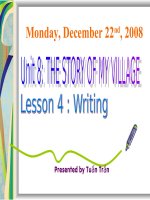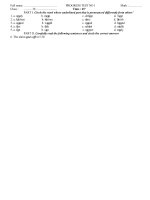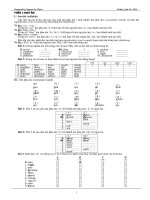ENGLISH 10
Bạn đang xem bản rút gọn của tài liệu. Xem và tải ngay bản đầy đủ của tài liệu tại đây (853.62 KB, 19 trang )
conserve (v.) / k6n
/
s3:v /: protect sth. from harm
conservation (n.) /
/
k4ns6
/
vei~n /
destroy (v.) / di
/
str0i / : kill sb. / sth.
destruction (n.) / di
/
str^k~6n /
constant (adj.) /
/
k4nst6nt / : always present or
available
play a part / role in sth. :
worsen (v.) /
/
w3:sn / : become worse
make sth. become worse
pass a law :
defence / defense (n.) / di
/
fens / :
bảo tồn (v.)
(n.)
hủy diệt (v.)
(n.)
nhất đònh
đóng vai trò trong
trở nên tồi tệ hơn
làm cái gì trở nên
tồi tệ hơn
thông qua luật
bảo vệ , phòng thủ
A B
1.eliminate
2.circulation
3. run-off
4. hydroelectric
a. the movement of something around
a closed system
b. concerning or producing electricity
by the power of falling water
c. remove or get rid of completely
d. liquid which flows off or from
(something )
/ i
/
limineit /
/
/
s3:kj$
/
lei~n
/
/
/
h@idr6$i
/
lektrik /
TASK 1 : Match the words in A with a suitable definition
in B
HYDROELECTRIC DAMS
TASK 2: Decide whether the following statements are true (T)
or false (F) Check () the appropriate boxes . Then
correct the false statements .
1. Each year about fifty hundred species of plants and
animals are eliminated .
2. Many kinds of plants could be used to treat various
dangerous diseases .
3. Water can be held on land by vegetation .
4. Man is constantly doing harm to the environment .
5. Plants may cause floods and erosion .
6. We can do nothing to save the earth .
T F
LUCKY ANIMALS
1
2 3
654
7
8









